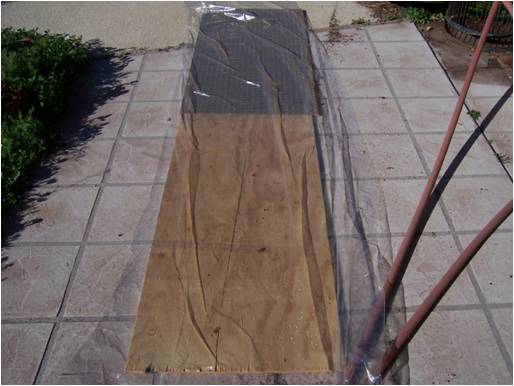Creating Everyday Art
Monday, January 17, 2011
Monday Project - Sun Printed Fabric
I finally got to try out a fabric dying method I've been looking at for a long time! Since I live in a (usually) very sunny place, sun printing on fabric seems perfect. I ordered the dye a couple of months ago and we began having unusually cloudy or partly cloudy days. Hmmm. The last week was gorgeous, though, so I got out the dyes and tried it out.
Materials:
*Natural fabric such as cotton or silk - the paint also says it works on most synthetic fabrics, but I didn't try that out
*Pebeo Transparent Setacolor
*Paint brushes and/or foam brushes
*Tablespoon measurer that won't be used with food
*mixing containers that won't be used with food
*protective gloves - trust me, Setacolor dyes skin REALLY well
*plastic - I used painting drop cloth
*board or heavy cardboard
*sun!
1. Outside, cover a board with plastic. Mix up your paint - 2T water to 1T dye.
2. Lay your fabric on top.
3. The instructions say to wet the fabric. I did that on my first two tests and the color looked really washed after heat setting and washing. With the scarves and bubble wrap fabric (below), I painted the dye onto dry fabric and the colors didn't change.
4. Lay objects on the painted fabric. In the photo below, I laid lace over the scarf and large bubble wrap over a test piece of material. Set out in the sun and leave until dry.
This is how the lace covered scarf turned out:
And this is the large bubble wrap:
And my first two tests/results:
6. You can set the dye by ironing for 3 - 5 minutes or putting in a 300F oven for 5 minutes. I did the ironing, but the oven method sounds good if you have a lot of fabric.
As you can see from the blue scarf, even though I saturated the fabric so that the dye came through to the back, it turned really light.
With the pink scarf, I soaked it in mixed up dye, squeezed out the extra, and saved it for later. It turned out better, but the back is still lighter than the front. This isn't a problem if you're dying the material for something one sided, such as quilting, but something to be aware of if you're planning on the fabric being seen from both sides.
I wanted thinner scarves, so I folded the blue scarf in half and sewed along all the edges. I then thread sketched (same instructions as free motion quilting described here) flowers, first in a variegated thread and then went over the centers in silver thread.
The final step was to sew small beads into the centers of the flowers.
Happy Creating! Deborah
Subscribe to:
Post Comments (Atom)














Ooh that's so pretty! I can't wait to try this! I'll be linking as well.
ReplyDelete